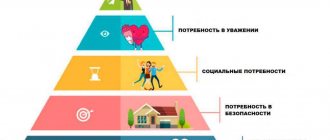Man's place in society
Society consists of numerous groups of people, public organizations, and individuals connected by relationships. These relationships are regulated by social norms - rules of behavior accepted in society. But these rules are not the same for everyone; what is possible for some people is prohibited for others.
A police officer can carry a weapon and use force against violators of public order, but this does not mean that all other members of society have such rights. Social statuses and social roles help people understand their diverse rights and responsibilities. They depend on the age, financial and marital status of the individual, level of education, and profession. Social statuses and roles change as a person grows up, his career grows, and he gains access to power.
()
Social status is the position occupied by an individual in society. This provision imposes on the individual a number of responsibilities, rights, and privileges.
Example.
- Alexandra Ivanovna is a seller, this is one of her social statuses. It imposes certain responsibilities on a woman: to be in the store from 8 a.m. to 6 p.m., sell people various products, advise customers on the quality or other characteristics of products. Along with her responsibilities, Alexandra Ivanovna has the rights to receive wages, take paid leave once a year, and go on sick leave in case of health problems.
- Sasha Ivanov is a seven-year-old child, this characteristic is the social status of a person. Sasha has the rights: to the care of his parents, their love, to provide him with clothes, food, toys, books and everything that Sasha needs. But along with rights, Sasha has some responsibilities: obey his parents, study at school.
- Vladimir Alekseevich is a grandfather - this is one of his social statuses. Vladimir Alekseevich has the right to see his grandchildren, buy them gifts, and share his life experience with them. His responsibilities include taking care of his grandchildren when their parents are not around.
The same individual may have several dozen social statuses, which impose on him certain rights and responsibilities. Each social status has its own manner of behavior, which is called a social role. Even by the clothes an individual is wearing, one can understand his social role and expect certain behavior from him in society. Seeing a military uniform, a doctor's robe, or a formal business suit, one can guess about the social status of a given individual.
This is interesting! In the recent past, about 200 years ago, one could understand from women’s clothing whether a woman was married or not, what her family’s income was, what social class she was from, where she was from. Time has changed and today the rules for wearing clothes are no longer so strict, but a person’s appearance can still tell about several social roles of an individual.
Features of the prescribed status
As for the education of boys, in adulthood it demonstrates the consequences of the educational process, which can be safely attributed to the opposite type. From a very early age, they know that it is better to be strong than weak, because they will have to protect timid girls, and then become a support and a strong shoulder for their entire family. Such methods, which contribute to the formation of personality, determine in the future the different social statuses of men and women.
It should be noted that many modern professions are relevant for representatives of both sexes. Some jobs can be done by women, and they can do them just as well as men, and vice versa. For example, in some states girls are not hired as domestic servants in wealthy homes. In particular, in the Philippines, only men are accepted to perform secretarial work, despite the fact that some hard work in the agricultural sector is amenable mainly to the weaker half of humanity.
What is social status
The concept of social status determines the position occupied and also reflects the hierarchical structure of the entire group. Status characteristics do not entirely depend on the efforts made by the individual; they are determined by the surrounding society, endowing or depriving them of certain functions based on not always objective factors. It is worth noting that the social status occupied is not a static concept and changes in accordance with external circumstances or by a decision made by the person himself. Also, the status may cease to exist completely if a person leaves a given social group or ceases to build his activities on the basis of the rules that govern the behavioral manifestations of people.
Increasing social status is possible with a person’s independent efforts and aspirations (obtaining additional education, creating a social movement, increasing the number of orders carried out), as well as due to social processes (military conflicts, change and seizure of power, death of superiors).
The statuses of one person are divided into personal and social-public, which is determined by the person’s inclusion simultaneously in social groups of various sizes. Personal status includes the place a person occupies in a small group (family, immediate peer group, team, etc.). The position held here is regulated by personal qualities and the ability to build strong and productive interpersonal connections. The better a person is perceived by others, the more positive emotions they experience in his direction, the higher his status. It is quite simple to adjust your place in a small group; it is characterized by frequent changes in positions, which is largely determined by the emotionality of perception and reflects relationships and their processes.
The social status of a person refers to the place he occupies in a large group of people, distinguished on the basis of certain categories (gender, nation, religion, profession, place of residence, etc.). The perception of personality qualities and characteristics at this level is regulated not by the group of people themselves and their influence, but by the global position of this social category in society. It is the lack of flexibility in this matter and the scale of perception that explains the derogatory attitude based on their race, the oppression of rights and freedoms based on gender characteristics and religious preferences.
Status symbols: types
Status symbols are designed to show the owner's position in society. This demonstration is achieved in different ways. However, the ways to show one's position in society depend on one's status and change over time.
So, in the past, merchants, in order not to get lost in the general background, wore clothes of a certain style. The nobles surrounded themselves with a retinue and messengers. They stood out due to the style of clothing, heraldic signs on carriages, weapons and even elements of clothing.
Surviving status symbols can be divided into general and specific, that is, characteristic of social groups.
Common status symbols
The category of general status symbols includes things that emphasize the high income and (or) social significance of the owner. They have no specific affiliation; they are sometimes used by numerous groups of people over a large territory. Common status symbols are:
Military ID with a record of service. In most regions of the country with a patriarchal structure, and often in the central ones, it is perceived as the only normal identification of a healthy male identity. Entries like “did not serve” or the absence of a military ID raise doubts: the man is either seriously ill, or has a criminal record, or is of the wrong sexual orientation. In most cases, being on the same hectare with “such a person” is shameful.
Owning your own home is a sign of wealth all over the world. The level of wages that allows you to buy an apartment or house, in the assessment of an employee, means recognition of the specialist’s merits. In assessing a businessman, these signs indicate an effective manager and a prudent owner.
Owning a car has several significant meanings. For men, a car, first of all, is an analogue of knightly armor and a horse. In other words, a symbol of power, strength, masculinity. For women, the car represents the semblance of a medieval carriage - a means of transportation with luxury, distinguishing the owner from the crowd. Secondly, the make and condition of the car emphasize the wealth of the owner. In the third, they show the owner’s social class.
Family also has a number of meanings. Thus, for a woman, family is one of the main goals in life, and at the same time a platform for full realization. For men, family serves as a sign of wealth and organizational capabilities. At the same time, the family evaluates the man’s level of capabilities. Thus, a single person often does not get a high position. Not so much because of organizational abilities, the manifestation of which is a strictly individual matter. A high position means serious workload. But a man can relax after exhausting work either in a bar with a drink, or at home with his wife. Sooner or later, drinking alcohol ends in deteriorating health. In most cases, employers are not interested in the health of the employee, but in the ability to cope with the assigned tasks. Of course, a healthy person always does a better job than a sick person.
Shoes , or more precisely, their condition, are perceived together with the state of affairs of a person. A man's sparkling shoes are part of the impeccable image of a successful man. A woman's elegant, clean shoes are part of the image of a successful lady.
Clothing reflects a person's activities. Of course, in some segments of society, the classic suit is considered the only acceptable style. However, barely noticeable folds and abrasions in clothing give the owner away. For example, a suit that is too expensive for a novice businessman indicates to potential investors that he is a spendthrift and has little interest in the work of the enterprise. And yes, a man looks more respectable in a cheap suit than in expensive jeans and a sweater. Expensive but tasteful clothes on a woman show her husband’s earnings.
Wristwatches for men reflect the level of earnings and style of activity. The vast majority are exclusively male.
The tie is one of the phallic symbols and a “secondary sexual characteristic” in men's clothing. At the same time, it indicates the owner’s tastes and ability to achieve his goals. The classic symbol of a successful man is a blue striped tie.
Tattoos are a separate topic in symbols of success. There are decorative, specific and identification tattoos. Specific tattoos include criminal ones. They can be applied voluntarily or forcefully, such as the “ring of meanness.” Most army and navy tattoos serve as identification. Sometimes people involved in extreme hobbies get tattoos indicating their blood type. Decorative tattoos reflect the interests of the owner and serve as a means to stand out.
Specific status symbols
Specific status symbols serve several functions. In most cases, emphasizing the position in society for such symbols is a secondary function. Specific status symbols include:
Slang. In most cases, jargon serves as a means of communication in a professional environment. "Broom" can mean not only a sweeping tool, but also a data storage device in a computer. And “Cheburashka” is not only a fairy-tale character, but also a slang name for one of the mobile radars for army needs.
The style of clothing accessories emphasizes the owner’s occupation. Moreover, much stronger than clothes. For example, a shoulder-strap laptop bag can only hold a few papers and the device itself. However, most people do not need to carry a laptop with them often. Combination with other clothing details reveals a curious tourist or a programmer rushing to work.
Regular record keeping is typical for people with a high level of organization of work and mental processes. In most cases, these are middle and senior managers, writers.
Only status symbols that are found at almost every step are described. Listing all the symbols with a two-sentence story about each would take up an entire volume of the Great Soviet Encyclopedia. Therefore, we are forced to stop for now within the framework of this article.
Reasons for the generation gap
Young people and teenagers are often offended by the older generation for the many prohibitions and restrictions imposed on them. Psychologists call this a breakdown of connections between generations. But when parents forbid teenagers from watching TV, playing computer games, drinking alcohol, or staying in the company of friends, they are simply fulfilling their social roles. Parents are strict not out of harshness or lack of love towards their children, but out of duty towards them.
()
Teenagers dream of growing up faster, they promise themselves never to act in the same way towards their future children, they dream that when they become adults, they will allow their children to do whatever they want. But having matured, teenagers change their view of the world and, having become parents, also show some severity towards their children. The problem of a breakdown in communication between generations leads to a lack of mutual understanding between older and younger ones. To fix this, everyone needs to try to put themselves in the other’s place.
The influence of social role on personality development
The influence of social role on personality development is great.
Personality development is facilitated by its interaction with persons playing a range of roles, as well as by its participation in the largest possible role repertoire. The more social roles an individual is able to reproduce, the more adapted to life he is. The process of personality development often acts as the dynamics of mastering social roles.
Role conflicts
Role conflict is a situation in which an individual with a certain status is faced with incompatible expectations.
The situation of role conflict is caused by the fact that the individual is unable to fulfill the requirements of the role.
In role theories, it is customary to distinguish between two types of conflicts: inter-role and intra-role.
↑ Concepts “Man, individual, individuality, personality.” Correlation of concepts.
Human
- an integral biopsychosocial being associated with other forms of life, but separated from them, capable of producing tools, possessing articulate speech and consciousness, and moral qualities.
Man is a subject of socio-historical development, the creator of material and spiritual values. The biological and social principles in a person are in complex interaction and determine the mental development and uniqueness of the human personality. The social in a person is born and develops in the course of his conscious activity and communication. If heredity is called a prerequisite for human development, then the social environment is considered the source of its development. An individual
(from Latin individuum - indivisible, individual) is a single representative of the entire human race.
Individuality
(from the Latin individuum - indivisible, individual) is the unique identity of a person, a set of his unique properties.
If, using the word individual, we are trying to note the connection of a person with other representatives of the human race, then the concept of “individuality,” on the contrary, distinguishes a person from the community of other people. Personality
(English personality; from Latin persona – actor’s mask, role) – 1) special qualities of a person acquired by him in the sociocultural environment in joint activities and communication;
2) a person with his own socially conditioned and individually expressed qualities (intellectual, emotional, volitional, moral, etc.) The relationship between the concepts of “individual”, “individuality”, “personality”
can be expressed by the formula:
“One is born an individual.
They become a person. Individuality is defended." A particularly significant period in personality development is adolescence and early youth. At this time, the developing personality begins to distinguish himself as an object of self-knowledge and self-education.
Test on the topic “Man, individual, individuality, personality.”
TASK 1. TASK 2. TASK 3. TASK 4.
TASK 5. TASK 6. TASK 7. TASK 8. TASK 9. TASK 10. TASK 11. TASK 12. Human needs
| VIEW | OBJECT OF NEED |
| Physiological | Food, water, air, climatic conditions, etc. |
| … | Communication, social activities, public recognition, etc. |
TASK 13.
TASK 14. TASK 15. TASK 16. TASK 17. TASK 18. TASK 19. TASK 20.
Kinds
Each person occupies several status positions in society at the same time. Their number is determined by the range of connections and relationships in which the individual is a member. The set of all statuses that characterize a given person is called a status set . It is different for each person. It is based on general statuses - person, member of society, citizen.
Of all the statuses possessed by a person, it is always possible to single out one that has the greatest meaning for him. This status is called main or integral. It is he who determines the style and lifestyle, immediate environment and forms of interaction of the individual with other members of society. The opposite of it is secondary or situational statuses. A person changes them several times a day, depending on the situation in which he finds himself (client, interlocutor, buyer).
The statuses of one person are determined by his inclusion in various social groups and are divided into:
- personal – places occupied by a person in small groups: family, peer group, work team;
- social – places occupied in large groups (gender, ethnic, religious, professional).
According to the degree of formalization, statuses are distinguished:
- formal – positions enshrined in official documents;
- informal – statuses that do not require documentation.
There are also statuses:
- innate – biologically inherited: nationality, race, gender;
- attributed (ascriptive) – acquired regardless of the individual’s desires: age, social origin, place of birth, family ties;
- acquired – received as a result of significant events: inheritance of title, fortune.
- achieved - those that a person receives as a result of his efforts;
- mixed - acquired as a result of an unfavorable combination of circumstances (war, loss of job, health).
Society not only creates social statuses, but also ensures the distribution of individuals according to social positions.
Social roles and age
Each age group has its own social status and social roles. The main age groups are:
- Infancy;
- Preschool age;
- Junior school age;
- Adolescence;
- Youth;
- Maturity;
- Average age;
- Elderly age;
- Old age.
()
Depending on a person's age, society expects appropriate behavior from an individual. For example, teenagers would look ridiculous crying loudly in a store and asking their parents to buy them a toy.
Of all ages, the transitional age is special, falling on the period from 12 to 15 years. During these years, the child is already leaving childhood behind and is just beginning to master the social roles of a teenager. A teenager acquires new social statuses in a group of peers, family, sports clubs and interest groups, and a group of friends. Along with the acquisition of new statuses, there is a rapid development of social roles in adolescence.
In addition, during adolescence, young people begin to learn gender roles in society. Girls learn to cook, sew, take care of younger family members, begin to use cosmetics, and acquire their first communication skills with the opposite sex. Boys learn to handle various household tools and master self-defense skills.
Diversity of social roles in adolescence:
- Son daughter;
- Leader/outcast;
- Brother/sister;
- Housewife/host;
- Pupil/student;
- Athlete/athlete;
- Boyfriend/girlfriend;
- Reader/Writer;
- Video blogger;
- Excellent student/good student/C student;
- Boy/girl;
- Conscript (for the military registration and enlistment office);
- Artist;
- Musician;
- Dancer.
For deviation from the role expectations prescribed by society for a teenager in connection with his social status, society can punish him with disapproval, the introduction of prohibitions and additional requirements.
Example. Marina Nikolaeva is the class leader. This social status of a teenager prescribes a certain type of behavior for Marina: she must set an example for her classmates, be responsible, not skip school, and be responsible for the safety of the school magazine. Recently, Marina persuaded her classmates to skip a physics test. The whole class immediately agreed. It turned out that they skipped not an ordinary test, but an important section of knowledge for the 8th grade. The class teacher found out about this incident and Marina’s misconduct and appointed another head teacher in her place as punishment for what she had done.
Let's summarize the above
The social status of a person has a number of patterns.
Its formation is influenced by objective unconditional and conditional factors. It imposes certain restrictions on the owner and obliges him to take appropriate actions in a particular social role. Every person has a status from birth and, depending on the circumstances of his life, can change. A group of people can also have status; its social role is subject to the same rules as that of an individual.
Dear readers, we would be interested to hear your opinion.
Mozhaeva Taisiya Apr 01, 2020
What is status?
By definition, social status is the position occupied by a person (or social group) in society
At the everyday level, social status is considered an important part of a person’s self-determination. An idea of the situation in society at certain stages of personal development helps set goals and identify the range of tasks necessary to achieve them
The philosophical encyclopedia interprets status as a person’s position in the social system. The position is determined according to a system of economic, professional and ethical characteristics. Depending on whether a trait is inherited (for example, gender, race) or acquired during life (for example, professional experience, personal achievements), prescribed and achieved statuses are distinguished. Accordingly, a person receives prescribed statuses by birth - belonging to a certain gender, nationality, race, given biologically beyond human will and consciousness. Achieved statuses are acquired by a person thanks to certain efforts - qualifications, education, position, etc. It is believed that the freer the society, the more important the achieved statuses play, and the less important the prescribed ones.
Position in society is closely related to social role, in other words, to work performed for the benefit of people. It is worth noting that the concept of status and the above characteristics are constantly changing.
Thus, the status of a military officer in the Russian imperial army a century ago was associated with above-average income, comprehensive education according to stricter world standards, and a strict code of honor. By the mid-1980s, a significant part of the USSR army officers served far from large cities, but were provided with housing. The size of the salary depended on the type of military service and place of service, but the income was significantly above average. Education was still considered the best. Although the code of honor was observed, it was considered a relic.
Now military officers are financially secure at an average level, and in some places even lower. Education is at an average level, and the notorious code of honor is being restored.
Russian veterinarians, who 100 years ago were part of the elite along with officers, are now completely self-sufficient. But this was not always the case. Thus, at the beginning of the last century, Russian veterinarians, upon entering government positions, received housing and funds for independent equipment of the hospital. Previously, they studied at the best higher educational institutions and received moral training. After all, I had to work literally “in the middle of nowhere.” After the First World War, veterinarians had to be found throughout the country. There was such a shortage of specialists that a livestock catastrophe began, and in the late 1920s. The veterinary service was transferred to the NKVD. Veterinarians were awarded officer ranks and provided with appropriate salaries and even rations. The level of education has fallen.
By the middle of the last century, the level of official income of veterinarians decreased, as did education. All that was left was moral toughening. Recently, the level of education of veterinarians has been rising, but unevenly. Moral strength has almost disappeared, and official incomes are below average.
Representatives of other specialties face a similar situation. Thus, engineers a century ago were far from the state elite. They received a varied education, which determined their income level. And, alas, they were deprived of both ethical community and the concept of a workshop code. Therefore, some took into the air the largest aircraft at that time, the Ilya Muromets, while others puzzled over increasing the efficiency of presses for squeezing out oil. With pay corresponding to the task.
The social or labor task assigned to representatives of the profession ultimately determines prestige. It is one of the main criteria of social status.
However, the status is not limited to all of the above
It is important for a person to show his position in society not only in his immediate environment. Since people are beings, including social ones, manifestations of status are aimed primarily outward, at other members of society
So that they appreciate it.
How is one’s position in society assessed?
Famous sociologists T. Parsons, M. Weber, and W. Warner studied the emergence of inequality in society.
Scientists have identified the main criteria that indicate the position of an individual in society:
- Income is the amount of regular cash receipts.
- Wealth – savings, private property.
- Education – level of training, authority of educational institutions.
- Power is the ability to impose one’s will and influence people.
- Prestige is the public assessment of a profession or other activity.
Social statuses are grouped precisely according to these indicators.
For example, income level divides people into poor, rich and middle class. The degree of influence is on directors and ordinary employees.
There are also auxiliary criteria that determine a person’s “starting” position in society. These include: socio-economic status of the family, gender, race, religion.
Importance for society
During the Russian Empire, status played a decisive role: society had a pronounced caste structure. At the same time, the groups were built in a hierarchical order: from disenfranchised peasants to respected, wealthy hereditary nobles.
The USSR supported the ideology of universal equality, but at various times it obliged Soviet citizens to indicate in their passports information about nationality, places of work and criminal records.
Today, membership in a social group is recorded to a minimum in documents, and civilized society tries to reduce the significance of prescribed statuses - race, gender, origin. A person’s personal achievements come to the fore. However, some groups are still valued more than others.
For example, the profession of a lawyer is more prestigious than the work of a plumber or handyman, and women's work is paid 30% lower than men's.
The place in such an invisible hierarchy is called rank, which can be high, medium and low. Society condemns the mixing of different categories: a striking example is unequal marriages, where one of the spouses is much richer than the other.
A group of researchers from Canada has proven that a low position in society is harmful to health. This is due not only to the habits of the “poor” - smoking, eating “junk food”, poor medical care, but also to a negative self-perception.
Social status influences social relations. The poor dislike the rich, the childfree dislike large families, and the workers dislike intellectuals. Rejection gives rise to racism, sexism, and movements that persecute sexual minorities.
Social status development system
It is also important to take into account the fact that in modern society the position occupied is very mobile (constantly changing). Today the whole world knows a person, but the next day everyone has forgotten about him. Also, the social system develops in two directions: horizontal and vertical.
In the first case, this is when a person worked as an accountant in a ventilation installation company, and moved to a gas pipeline installation company. Or I was a traveler and became a travel blogger. That is, only social groups change, but not status as such, since the influence on others remains, in essence, the same.
Naturally, the second option implies a rise or fall in position in society. For example, from an ordinary student from the Higher School of Economics to an opposition blogger and a candidate for the State Duma. Due to the fact that the scale of influence on society changes, the position in society also changes.
Hierarchy of statuses
Statuses in the social structure are unequal. In the public consciousness, individuals and groups are compared according to their status characteristics and are arranged in a hierarchical order. The social prestige of statuses and their hierarchy are formed under the influence of the following factors:
- the real significance of a particular status for society;
- system of values historically developed in a given culture.
Hierarchy types:
- intergroup – covers different groups within society;
- intragroup – ranks individuals within one group.
The position of a status in a hierarchy is called status rank. It determines the level of this status - high, medium or low. The plurality of individual statuses often gives rise to their discrepancy (inconsistency). It manifests itself in cases where a person occupies different status positions in different social groups and he has to perform conflicting functions, rights and responsibilities.
The concept of social status is related to the concept of social role. However, there are significant differences between them. If social status determines the place a person occupies in society, then the role characterizes social expectations based on this status. In situations of discrepancy, inconsistency of statuses, a role conflict may arise.
Social status in life
If anyone doesn’t know what is better to choose - to strive to occupy a certain status or to “forget” everyone and just live, I will clarify one more important point: a person with social status is one who is controlled by others (the crowd). Because, as I wrote above, today the situation can change quickly.
Any group of people needs, at a minimum, an organizer, and at a maximum, a leader - a person who will be responsible for everything. This is where a social hierarchy begins to form, where someone occupies a higher or lower position.
This means that a person who wants to succeed with a group must become someone who can make a significant contribution to achieving their goals. If you are not able to give people at least something, no one will follow you, which means that no one needs you.
As it was said in the TV series "House": "When a person is such a bastard, he is either a genius or unemployed." Accordingly, someone with a position in the group must say and do what others want to hear and see from him. Or be a genius who can be forgiven for everything. But, in any case, he is a “slave of the lamp” who must fulfill the wishes of the crowd or at least a separate group.
Therefore, single people can feel real freedom, without having any responsibility to others, and say whatever they want... but really, only in front of the mirror. In general, as someone said: “the real prison is only in the head.” The importance of having or not having a position in society is nothing more than an illusion. You need to live in a way that is convenient for you, the rest is not important. For example, Pierce Brosnan, when he starred in Bond, gave up on everyone and just started spending money. Of course, he’s still filming now, but he doesn’t have his former glory, but he has a lot of money. And there are plenty of such examples.
The influence of social status in society
So, now the most important thing is that in order to live happily, is it necessary to occupy a certain position in society? Not really, provided you don't mind the isolation.
The fact is that people at the genetic level are structured in such a way that in order to survive they need social groups and individuals who can lead them. This is a kind of shifting responsibility and searching for like-minded people.
To make it clearer, I will give an example from YouTube:
A truck driver from Russia will not be impressed by the Ukrainian president’s speech that officials should put a photo of their family in their offices instead of the head of state. The driver would have to raise his salary by 10 thousand, but whose photo the politician will have – he doesn’t care. At the same time, a representative of the aristocratic intelligentsia will be impressed by the president’s speech, and he will wish such a president for his country, not understanding how one can be so “petty” because of 10 thousand without thinking about the “highest”.
That is, in life, people, just like on FB or VK, are divided into groups of like-minded people. The intelligentsia unites with the intelligentsia, quitters with quitters, dummies with dummies, hard workers with hard workers, and so on. There they hear only what they like, and anyone who disagrees is sent to a “ban.”
At the same time, there have always been “lone wolves”. But a loner is a person who does everything himself. In ancient times, this required being able to chop wood, build a hut, and shoot a deer. Today, a single person should be able to sit through a working day in the office, pay for utilities and go to Pyaterochka. Therefore, everyone is free to determine for themselves the importance of social status. There are people for whom universal recognition is more important than air, and there are those who don’t care about anyone, just to live to see their salary. In general, the 21st century has given us complete freedom, and everyone lives as they want.
The influence of social status in relationships
Many people complain that women are materialistic. In fact, men are not inferior in prudence, they just complain about girls more. But speaking to the point: a couple, a civil relationship or a family is also a group, just a very small one. Therefore, at the genetic level, the same structure of relationships operates as during the formation of large social communities.
Therefore, in order for things to go easier when communicating with girls, you need to find friends either from your social circle, or “throw dust in your eyes.”
Recently, a programmer on one of the projects where I work complained that when he tells girls about business on the Internet, they lose interest in it. The fact is that the guy works as a freelancer and has launched two of his own online stores. But the girls are not impressed, despite the fact that he cannot be called poor in material terms.
I suggested slightly changing the format of my “resume” - to say that he is an entrepreneur, an IT specialist, and since he is in demand, he works with different people. Now he has launched two of his projects and plans to develop further. That is, he didn’t lie, he even has an individual entrepreneur, but he presented who he is a little differently. After all, it’s one thing to be an IT specialist, and another to be a seller and freelancer. In general, it worked.
Well, if someone doesn’t want to strive for social status for the sake of a relationship, Pornhub can help him. Because men love beautiful girls. And women spend time, effort and money on beauty in order to be able to choose those who have more influence on society.
Examples from life
People have different statuses - this is easy to illustrate with simple examples.
Example 1
When a child is born, he acquires a nationality, citizenship, and is assigned the permanent status of son, daughter, girl, boy. In the school class he acquires the position of a student, in the university - a student. Having received a profession, he becomes a scientist, lawyer, economist, builder. The number of positions achieved is constantly increasing. By using political resources, willpower, and experience, a person can rise to the top of the social ladder or, conversely, slide down, reducing the level of acquired status.
Example 2
A person's position determines his status set. For example, a man of Russian nationality, forty years old, working as a teacher at a university, has a wife, mother and son. In addition, he is an Orthodox Christian and a member of the editorial board. Every day he enters into various relationships, performs duties and defends the rights that preserve his position.
The attitude towards him is based on how he plays his social role and is reflected in the characteristics:
- good parent;
- excellent family man;
- devoted friend;
- loving son;
- strict teacher.
A person’s status set determines his position in society
The prestige and authority of a person depends on these indicators, but the main status—position—is most often decisive for determining one’s place in society.
Concept
Social status is a position in the social structure. The term is used in 2 meanings:
- The social status of an individual is a person’s position in society, in the system of social and interpersonal relations. It is reflected in the internal position (values and orientations, motivations), in external appearance, speech culture, jargon.
- The social status of a group is the place occupied by the group in the social hierarchy. Status groups are characterized by a specific system of values, norms of behavior, a certain lifestyle, type of education and occupation.
The concept includes:
- assessment by an individual or a group of their place in the social hierarchy;
- public assessment of the activities of an individual or group.
Social status is determined by socially significant characteristics :
- natural – ethnic, age, gender;
- economic – property and financial status, lifestyle;
- social settlement – city dwellers, rural residents;
- set of rights, obligations, functions;
- place in the hierarchy of political relations - possession of power, activity in political groups, organizations, movements;
- place in the division of labor system - education, type of employment, profession, qualifications;
- prestige - the social significance of a position occupied in society.
The combination of all these characteristics determines social position . The system of social statuses forms the laws of interaction (rights and obligations, hierarchy of subordination) of individuals and groups.
What is status incompatibility?
Status incompatibility is the different position of an individual in social groups. In one society he is in good standing, occupying high positions, enjoying respect and power. Among members of another social group, he is located at the lowest level of the hierarchy. An example is a banker whose social position obliges him to manage thousands of subordinates. They respect him, appreciate him and even fear him. At home, his wife humiliates him in every possible way and does not rely on his opinion. A similar attitude develops in children towards their father.
Spouse disrespect
Additional Information. If a person is stuck in an intermediate position, a prerequisite for the development of marginality arises. This happens when an individual is conditionally in a certain group, but does not accept its values, and exists on the edge. Or he left one society, refusing to obey its orders, but never chose the right one. He lives based on his own norms and rules, trying to combine them with the existing structure of society. This situation is fraught with the development of mental disorders.
Lumpens are another type of people who unsuccessfully left a social group. They lost their position and did not find a new one, finding themselves left behind in life. These are people who are outside of classes and strata of society.
Status incompatibility often arises when a person tries to move up the hierarchy created in society. He breaks away from his friends, changes his social circle, but is not necessarily accepted and appreciated, despite his achievements in the profession. A person grows up the career ladder, while the team does not respect him, but despises him in every possible way. He gets irritated, suffers from this, quarrels with his wife. The spouse, in turn, can also change her attitude towards her partner, based on his behavior: she begins to avoid him, ignores comments, and shows less attention. Thus, the high status provided by the position held is combined with a low position in the team and in the role of husband.
With status incompatibility, an individual does not enjoy the rights given to him in one society while being in another social group. They come into conflict. Deputies, called upon to represent the interests of the people, cannot engage in business and make a profit. Or a short example when a woman wants to combine work and motherhood and cannot perform equally well in both roles. The stereotypical opinion imposes on her the image of a housewife, which she tries to fight. She becomes a successful worker at the expense of time taken away from her family. Accordingly, children and husband experience a lack of attention and care, seeing a tired and exhausted mother and wife in the evenings. The assigned responsibilities cannot be fulfilled at the proper level in both areas. Increasing status in the profession leads to the infringement of household responsibilities, for which there is too little time and energy left, because you have to be at work more and more often.
Tired mom
It is considered incompatible when a person does not live up to the expectations placed on him by society. For example, a goalkeeper is seen drinking alcoholic beverages and smoking. An athlete is perceived as a person who leads a healthy lifestyle, who will not let you down and lives by training.
Note! Incompatibility of statuses causes the individual to suffer. He feels disadvantaged, unable to fully realize himself
Experiences disappointment in his own life, blaming himself or the environment for it.
A state of inadequacy and uncertainty leads to depressive thoughts and social tension that can develop into large-scale conflict. Similar problems are addressed by psychology, aimed at eliminating contradictions, intrapersonal and interpersonal conflicts.
Symbols and life
Status symbols are used unconsciously in most cases. People want recognition for their merits, and as long as the desire does not cause discomfort to others, it is quite normal. After all, the society that has become our habitat is created by joint labor. However, deciphering status symbols can be used in everyday life.
Male gaze
Thus, clothing and slang can reveal a representative of a certain profession to a random travel companion. By talking with him about his activities, you will learn a lot of new things and update your knowledge. And, according to the ancient proverb, “the road will be halved.”
Clients come to most organizations with their own set of needs. By learning about the reasons for the client's concern, you help solve his problem. You raise your level as a specialist, “grow” your earnings and acquire a regular client. These are the “bonuses” that understanding the symbols of a person’s social status can bring.
Live, communicate. And be happy.
Female look
It’s not for nothing that they say that “you meet people by their clothes.” A person’s appearance can say a lot: who he is, what he does, his hobbies, what he loves, and where he is in a hurry now. World progress, moving by leaps and bounds, encourages us to constantly stand out from other representatives of the same society. Well, few people want to “graze the rear” or simply be mediocre. In addition, many professions and social roles literally dictate their conditions to us: you must look like this and that, have this and that, and nothing else. Otherwise, you won’t be “one of us” in the “wolf pack”. This is how modern symbols of social status come into our lives and firmly establish themselves there. Whether this is good or not is most likely not for us to judge. After all, if such symbols exist, people probably need them and continue to fulfill the roles for which they were invented by the same representatives of humanity. And, therefore, as before, a man in a Bentley will look more like a wealthy businessman than a guy who arrived on a tram. Even if in fact the latter pickles dollars in three-liter jars under metal lids. However, you and I will never know about this.
In my opinion, any status symbols, of course, have the right to life and prosperity. But the main thing is that behind them the only, important, unique thing that personifies the innermost essence of each of us is not lost. Individuality, personality, soul, if you like. Something without which a person becomes simply a “subject”, without his own face. Even if he is in an expensive suit and the clouds are reflected in his shoes. But that's a completely different story...
“We wish you new discoveries, achievements, self-realization and great happiness!” Evgeniy and Anna Kutyavin
Achieved status
This is what a person achieves himself. By making efforts, making choices, working, studying, each individual ultimately comes to certain results. His successes or failures are reflected in the way society assigns him the status he deserves. Doctor, director, company president, professor, thief, homeless person, tramp.
Almost every achieved social status of an individual has its own insignia. Examples:
- for the military, security forces, internal troops - uniform and shoulder straps;
- doctors wear white coats;
- people who have broken the law have tattoos on their bodies.










